First time RVing in Canada – The Ultimate Guide
Our first time RVing in Canada was our best trip ever! Exploring Canada by RV brought all the experiences we wished for and even more. When we decided to plan our road trip through British Columbia and Alberta we were not sure in the first place to rent a camper in Canada. But after extensive research, price comparisons and the cravings for adventure we were convinced to go for it. As a first-time RV’er, I like to share all the important information we gained through this trip. Hopefully this will make your trip planning a bit easier in case you’re thinking about exploring Canada by RV. You will find everything from choosing the right RV, how to reserve the campgrounds, our total costs and all other important things you need to think about when RVing in Canada.
RVing in Canada – Exploring BC & Alberta by RV
Our Canada RV trip started and ended in Vancouver. We’ve rented our Truck camper with Fraserways and our RV trip lasted 5 weeks from 14 September till 19 October 2023, a total of 35 nights. During this time we traveled 4158 km and visited all the places we wanted without having any issues.
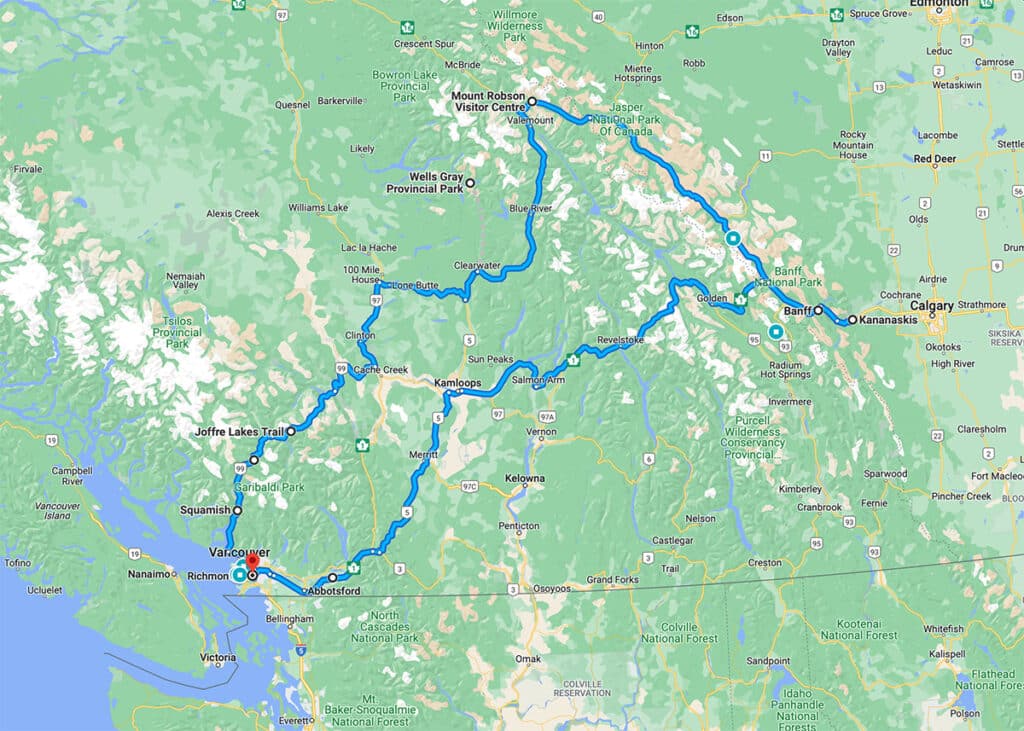
We love to be outdoors and because of the freedom an RV offers, we felt so much connection with nature. Most of the time we stayed at official campgrounds but we also enjoyed some boondocking (free camping). Others may refer to boondocking as off grid or wild camping. Basically it means that you don’t have the facilities you normally have at an official campground such as electricity, water etc. We used this website to find all Free Campsites throughout Canada. You can also use iOverlander website which is a valuable resource to find services while on the road such as potable water, sani dump sites and plenty of camp spots.
At most of the campgrounds in Canada we had a great experience. But to be honest, the most beautiful moments we experienced during wild camping. Being completely disconnected from the world and connected with nature and each other is something very special. RVing in Canada in general is a once in a life time experience!
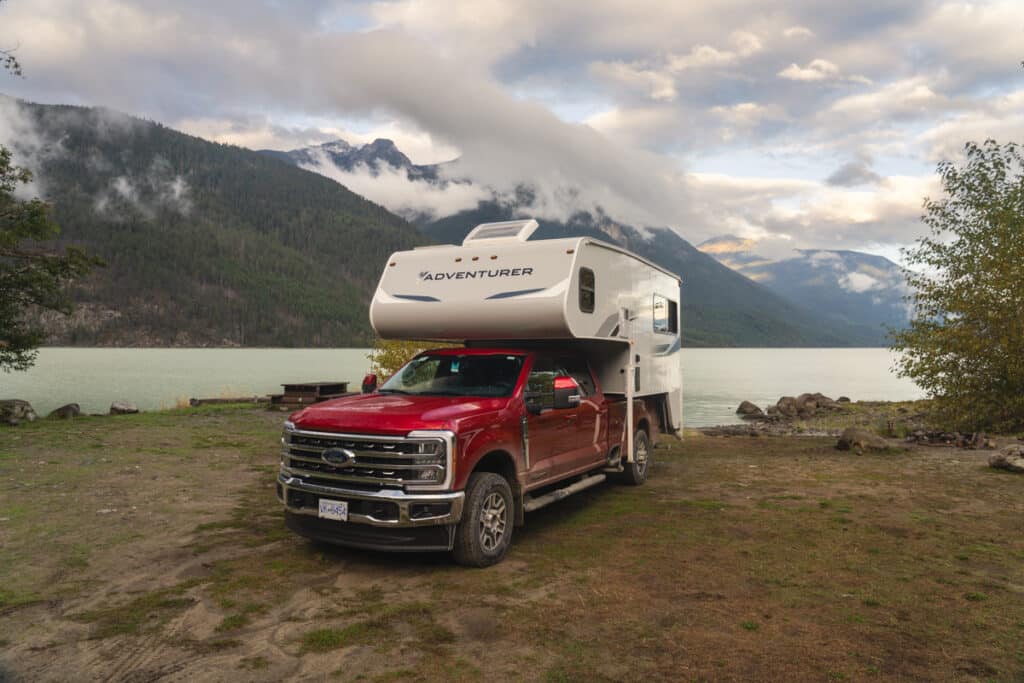
Our TOP PICK to compare and rent an RV
No time to read the whole article to find out where to rent an RV for your trip?
Don’t worry because I’m convinced you can find the best deal at Motorhome Republic. We booked our Truck Camper through this website as well. The whole process is super easy. They are one of the world’s largest online Motorhome and RV rental agency. Another great thing about booking with Motorhome Republic is they are committed to offer the lowest rental rate you can find online. They even offer you the possibility to send them an email in case you find a better quote on the same vehicle from another website.
How do I plan my Canada RV itinerary?
Well, the answer is easy. Just find a partner who loves travel planning like I have in Ilse haha! She did an amazing job planning the route and making an itinerary of all the places we wanted to visit. In our case, we always have to perform some extensive research in deciding which places we want to visit for our blog to write about. Besides this, we’re also looking for amazing locations to photograph and the most epic hikes. This Canada trip focused a lot on outdoor activities and some challenging and strenuous hikes.
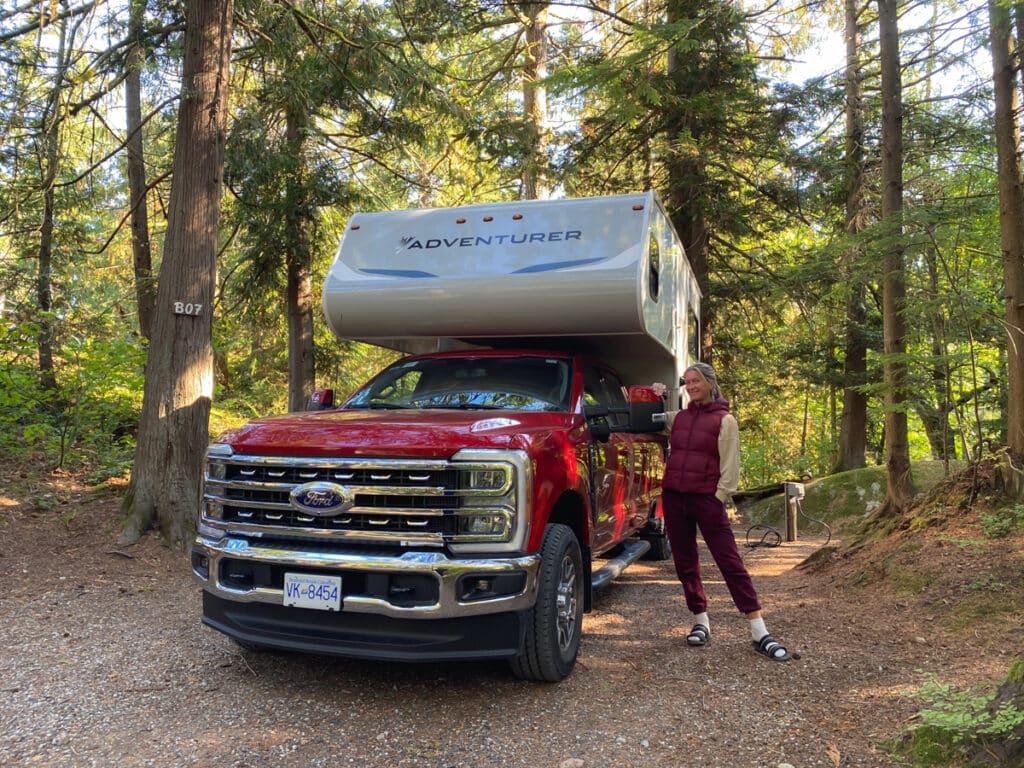
To plan our route we used Google Maps. This way we had a clear overview at which places we had to book a campground. At some places we stayed several nights to complete all the activities we planned. Also, this way we had a good estimation of the amount of kilometers we had to drive. In our case, we had to pre-book the amount of kilometers in advance. You will save yourself some money to get this right as extra kilometers will be charged for a higher rate.
Pre-book popular campgrounds
We’ve only pre-booked the popular campsites as they fill up quickly. So keep this in mind. Especially in the summer months and weekends you can easily miss out as popular campgrounds are fully booked months in advance. The main reason why we planned our Canada RV trip in September/October was because of the Autumn season. For us, this period timed out perfectly. The summer crowds were over and the Autumn season offered perfect weather for being outdoors. Besides the weather, Autumn offers amazing photo opportunities and we scheduled the whole planning to have peak Autumn colors in Banff National Park.
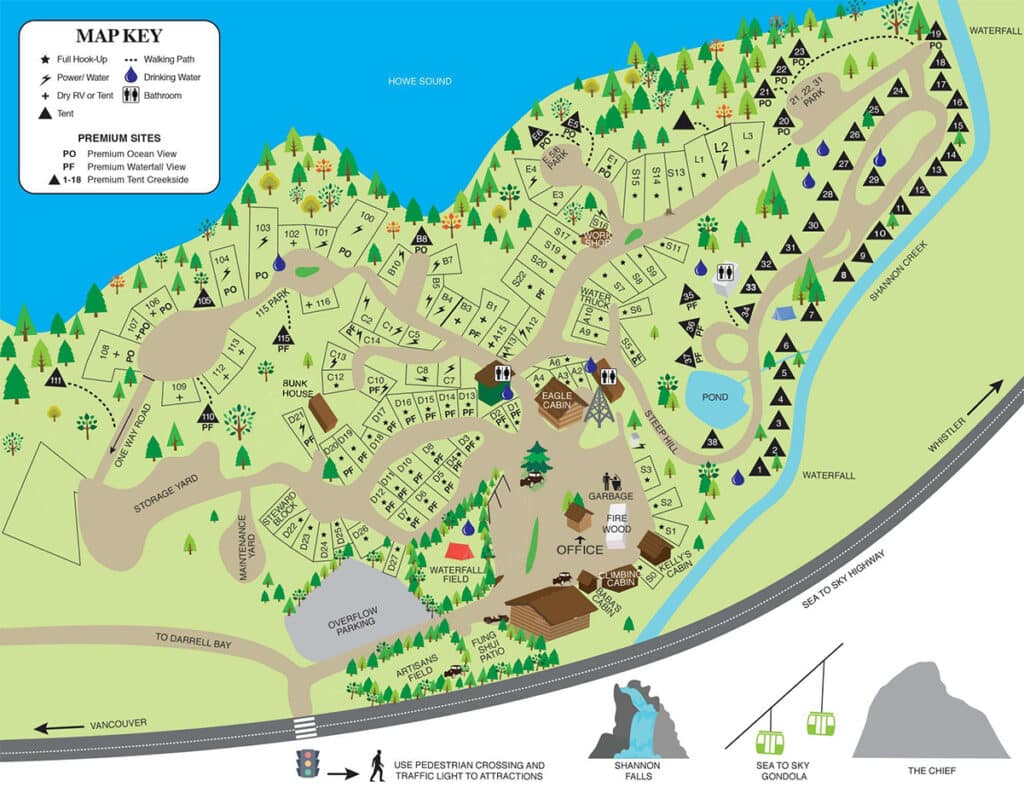
In most of the National Parks in Canada you can only find government campgrounds that you can book through the Parks Canada website. Outside of the National Parks you can mostly find private campgrounds. These can be booked through campground reservation management websites such as RoverPass, or find the direct websites of the campground in question. Although most of these websites are a bit outdated, you’ll find out in the end how to make a reservation. Either by email, phone or via a reservation system on the website. Overall, the best stays and facilities we have experienced were at the private campgrounds, not the BC Parks campgrounds. I will share more details about this further in this article about RVing in Canada.
How to choose your RV in Canada?
When selecting the perfect RV for your Canada trip, several factors come into play. Budget and the amount of people you’re traveling with is a huge factor in choosing the right model. There are a lot of RV rental companies and it can be a bit overwhelming to find out which one offers the best conditions. Luckily there is a way to make life a bit easier with this. We used Motorhome Republic for comparisons and ended up finding the perfect RV fit for us as a couple.
There are different types of RV’s:
- Class A Motorhomes: Spacious and luxurious, ideal for long trips.
- Class B Campervans: Compact and easy to manoeuvre, suitable for solo or couple travelers.
- Class C Motorhomes: A middle-ground option with a distinctive over-cab sleeping area.
- Truck Camper: A truck camper is a demountable recreational vehicle (RV) that is loaded and unloaded from the bed of a full-size or mid-size pickup truck.
The model we chose was a Truck Camper and this turned out to be the perfect combination for us. The drivability and comfort that our beautiful new truck camper offered was exactly what we needed. For sure there are several pros and cons between the different types. After spending 5 weeks in the Truck Camper we can share the following details about this type of RV.
Pros of a Truck Camper RV:
High-end drivability and comfort: The Ford F350 V8 Diesel truck we had was almost new (only 8000 km driven at pick up). It drives like a luxury car with all the options you need like navigation, heated & leather seats, amazing suspension, rubber mats and many more items. We truly miss this beast!
Diesel engine: Although in Canada the price/gallon for diesel is higher compared to gas, the fuel efficiency is better. During our trip, we drove around 4100 km with an average fuel consumption of 17 liter/100 km (40 mpg). The engine is very powerful, quiet and super smooth.
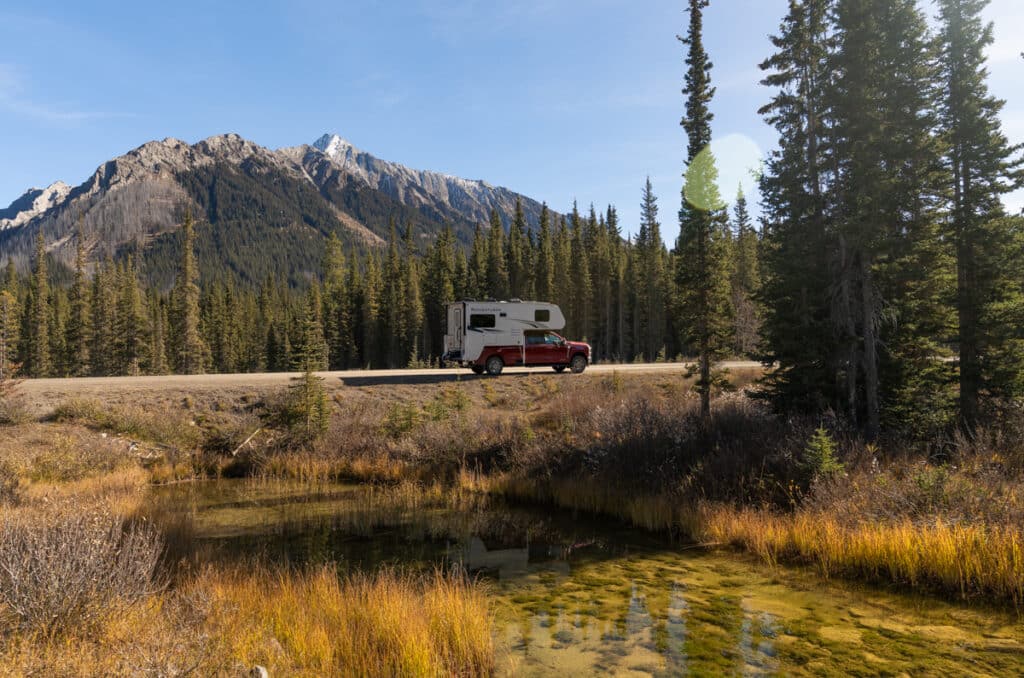
Four-wheel drive (4×4): Most truck campers are 4×4 which makes it very safe to drive with. Especially in wet and snowy conditions. Also, when you are an avid hiker like us and you plan to do some more challenging hikes you will appreciate the 4×4. Quite some hikes are only accessible by gravel roads. Most of these roads are accessible by car or motorhome as well, but you’ll feel more secure with a 4×4 Truck camper.
Camper Cabin with all the amenities we needed: The camper cabin from the brand Adventurer offered all the amenities we needed. Also, a big pro of the truck camper is the size of the bed which is wider than the other types of RV. The cabin was equipped with a kitchen/fridge-freezer/wet bath (shower + toilet), 4 person dinette set and an oven. It also came with an awning and 2 camping seats.
Con Truck Camper
If I have to name a con its the storage space. Because we were only with the two of us, we used the passenger seats in the truck cabin to store our stuff. Also, we left our big travel bags at the rental company and stored all our clothes inside the closet of the camper cabin. But if you plan to rent a Truck Camper with 3 or 4 people I would recommend a bigger motorhome.
Is it hard to drive an RV in Canada?
Driving the truck camper was not difficult at all. It feels like a passenger car on steroids. I’m used to driving Vans and little trucks and even horse trucks. For me, it felt the most like driving a horse truck. Not in the first place because of the dimensions but more because I drove very carefully. With a horse truck, you have to take in mind the horse in the back and you don’t want to brake or accelerate suddenly in an aggressive way. The same goes for your cornering speed. Of course, everything in your camper is well stored and the drawers are properly locked. But things like the dishes in the closets and your clothes as well can move around. With this in mind it certainly helps when driving a bit cautious. And always make sure to store everything before you start driving.
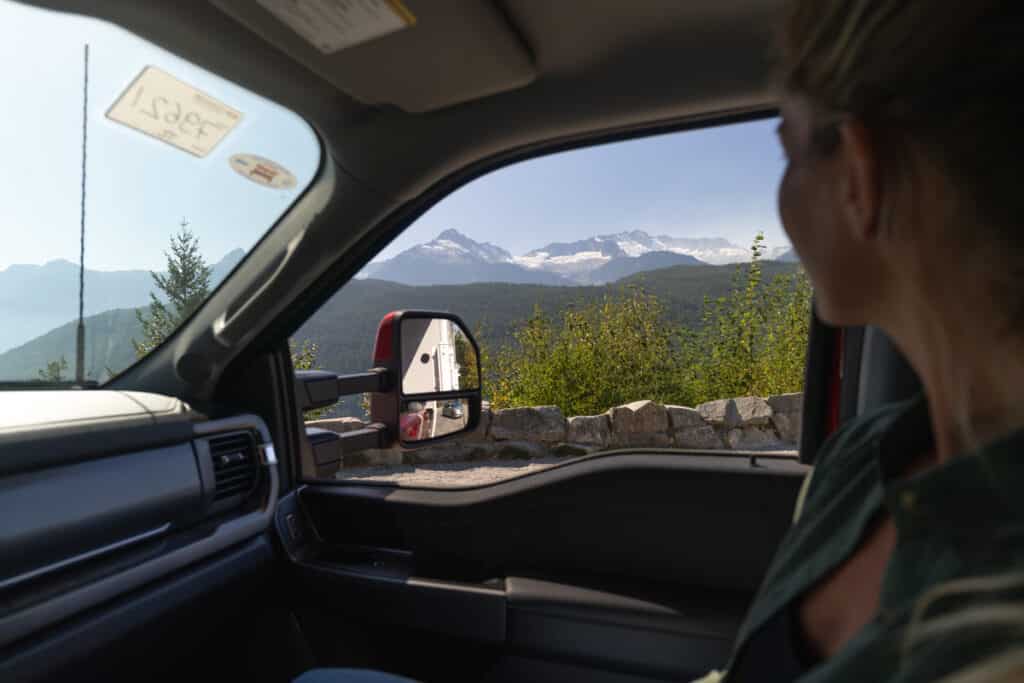
The seat position in an RV is high and results in a clear view. It’s very important to adjust your mirrors as well. I was able to adjust the side mirrors so they stuck out wider than the cabin itself. This way it was easier for me to estimate the width of the truck when driving through narrow roads. Because if the mirrors would fit the whole truck would fit.
When cornering you have to take in mind the dimensions of your vehicle. The same goes when driving through tunnels or underneath an overhang for example. Luckily the rental company had put a sticker with all the important dimensions and weight in the driver’s sight. Furthermore, the Canadian roads are very spacious and safe to drive. Also driving at the campgrounds was not too hard as most are spacious enough, even for the large RV Trucks.
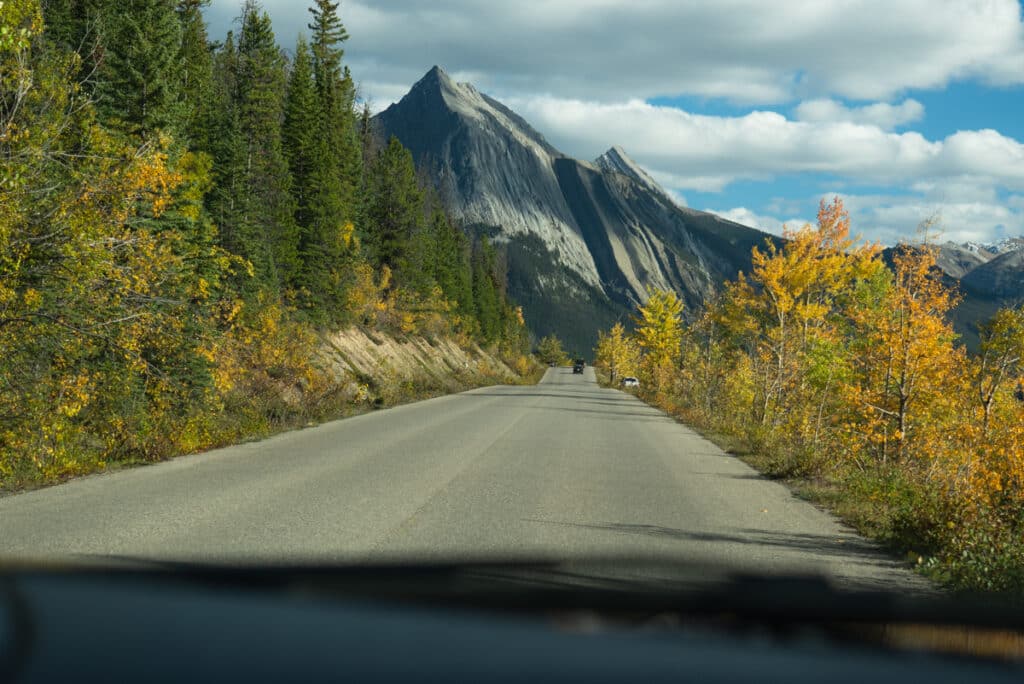
Where to park your RV in Canada?
When entering town finding a parking spot can be quite challenging. Especially because you are not allowed to park your RV everywhere. So please be aware of this. Most of the signs at the entrance of a parking lot inform you about this. We made a mistake once in Banff town by parking in a passenger parking lot. Luckily we only received a warning from the friendly officer and we were extra cautious after.
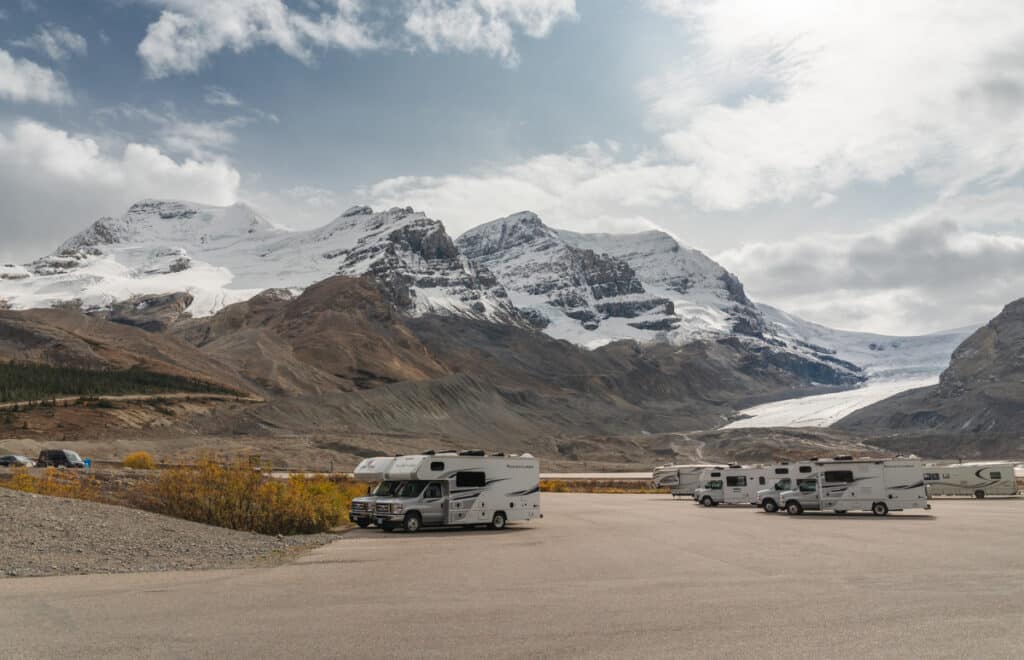
Parking at grocery stores wasn’t an issue at most places. Often you’ll need two parking lots because of the length of the RVs. Because of this I always tried to find a more quiet spot on the parking lot.
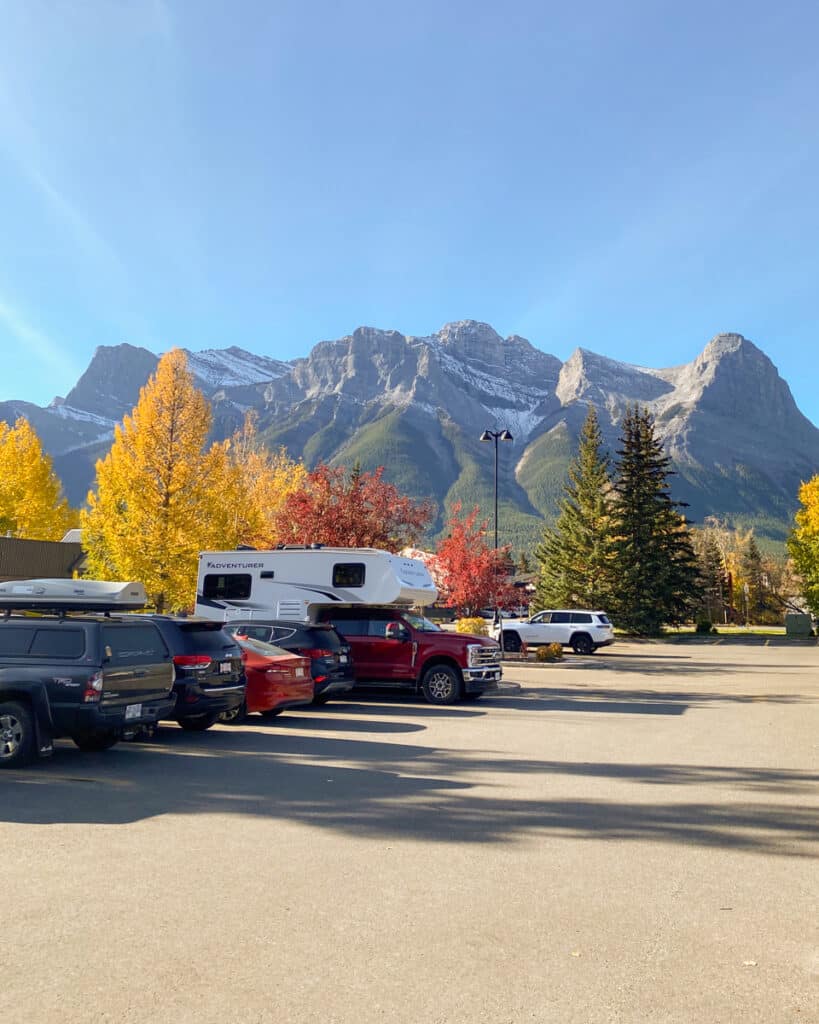
A the campgrounds you can either choose to reverse back in your designated camp spot or drive straight in. Some campgrounds offer the possibility to “drive through” your camp spot which is the most convenient way. Reversing an RV can be challenging, especially if you don’t have a rearview camera like we did. But with the help of your partner or friend, you feel more confident to reverse in tighter places.
Where to empty your RV’s black and grey water tanks?
Another important thing to take into account when RVing in Canada is emptying the waste tanks of your RV. You have to do it yourself so be prepared for this. But to be honest, it’s not hard at all. Most RV’s in Canada have a so-called grey water tank (waste from shower and sinks) and a black water tank (toilet).
From my own experience, the grey water tank fills up more quickly than the black one. Of course, this depends per person. But in general, you’re using more often the sinks together with the shower compared to using the toilet. Although the black water tank doesn’t fill up as quickly, it’s recommended to empty it once in the 3 days to prevent bad odours. For sure the non-formaldehyde toilet treatment deodoriser tablets will help maintain the toilet giving it a fresher smell. Every time after emptying the black waste tank you need to put one tablet in the toilet before you use it again.
Tip: Make sure to buy the non-formaldehyde toilet treatment in advance at Walmart. It will be a challenge to get them in smaller towns.
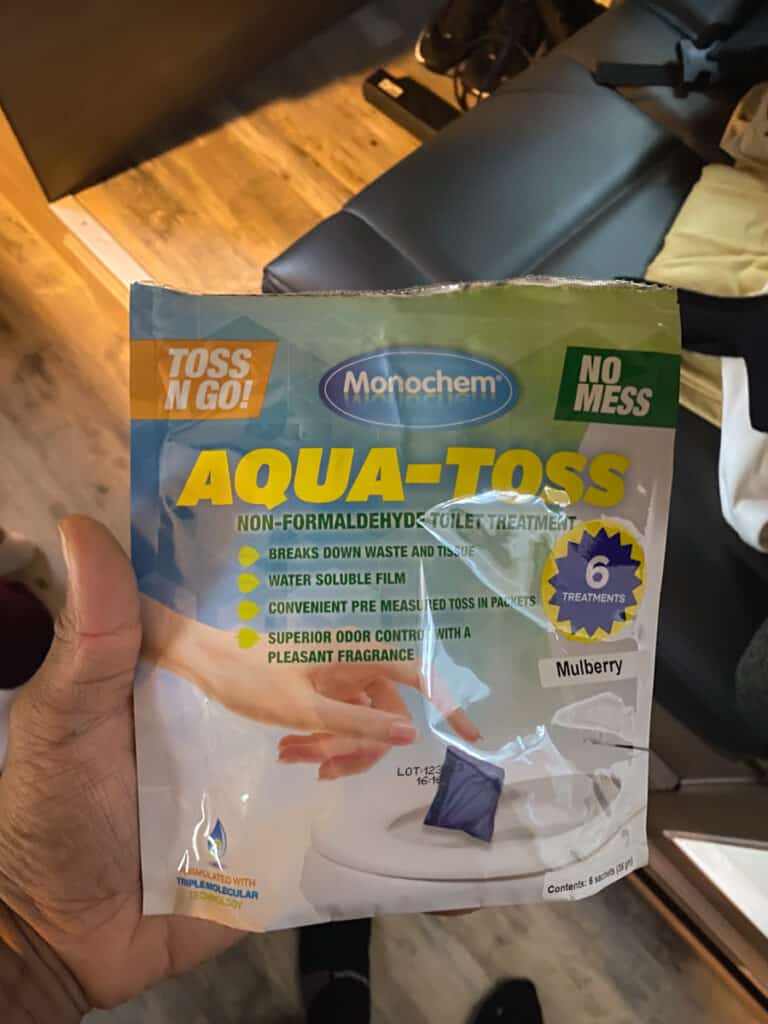
Different options to empty your RV grey and black waste tanks
There are different options to empty these tanks. You can either empty them at the general dumping station of a campground or your camp spot in case you have one with a hookup for the sewage hose. When available, we opted always for a camp spot with a full hookup. These will cost you more but it’s super convenient as you don’t need to drive to the dumping station or take this into account. You can leave your sewer hose connected and have the valve of the grey water tanks open. This way the water is drained immediately when using the sink or shower.
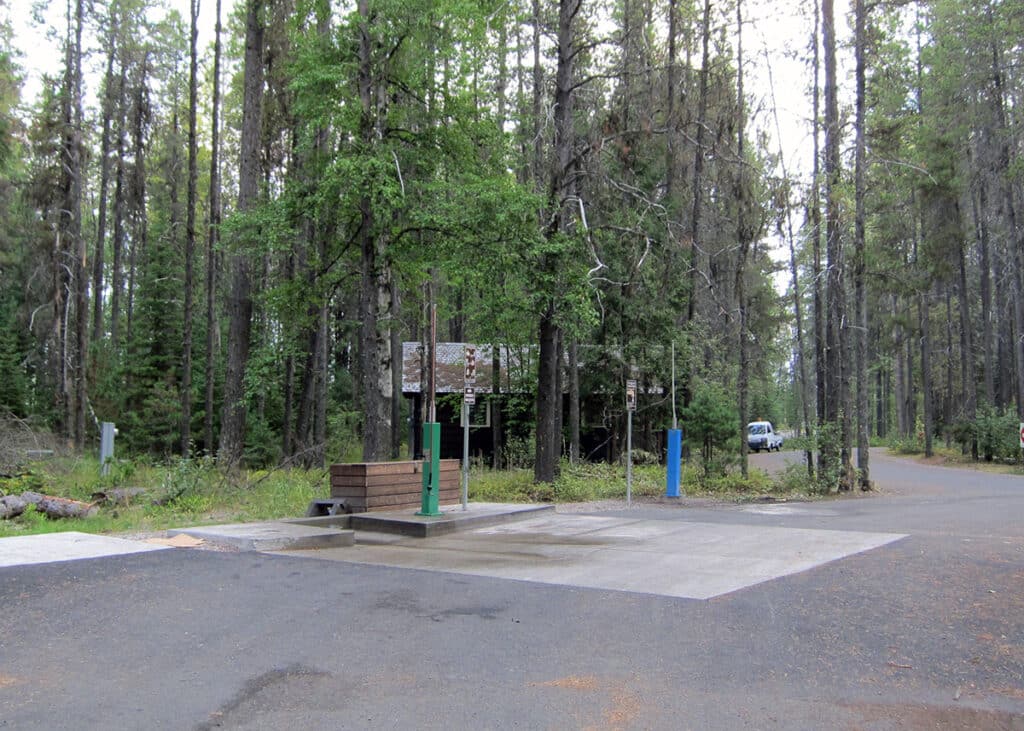
Some campgrounds don’t have a dump station. In this case, you need to look for a public dump station which will cost you CAD5 or CAD10 per dump. Never dump your waste in nature as this is illegal and you can receive a hefty fine for this! We used this website to search for public dump stations during our road trip across Canada.
How much costs RVing in Canada?
We shared a lot of our Canada RV trip on our Instagram stories and the most frequent question we received was how much RVing in Canada costs. To answer this question I’ve made the overview below with all direct costs related to the RV trip. Please take in mind the earlier you reserve an RV the better price you can get. So in case you’re planning your Canada RV trip head over to Motorhome Republic to make a reservation before the prices go up!
As our RV trip lasted 35 nights the average cost per night was CAD253/USD184/EUR169 just for the RV. This is the only fixed cost because the other costs mentioned are variable depending on the number of kilometers you drive and your personal needs. For the campgrounds, we spend on avarage CAD45/USD32/EUR30 per night. Based on our research and these 2 fixed costs we think we would have spent much more by booking accommodations and a rental car for this trip.
Cost overview Canada RV Trip
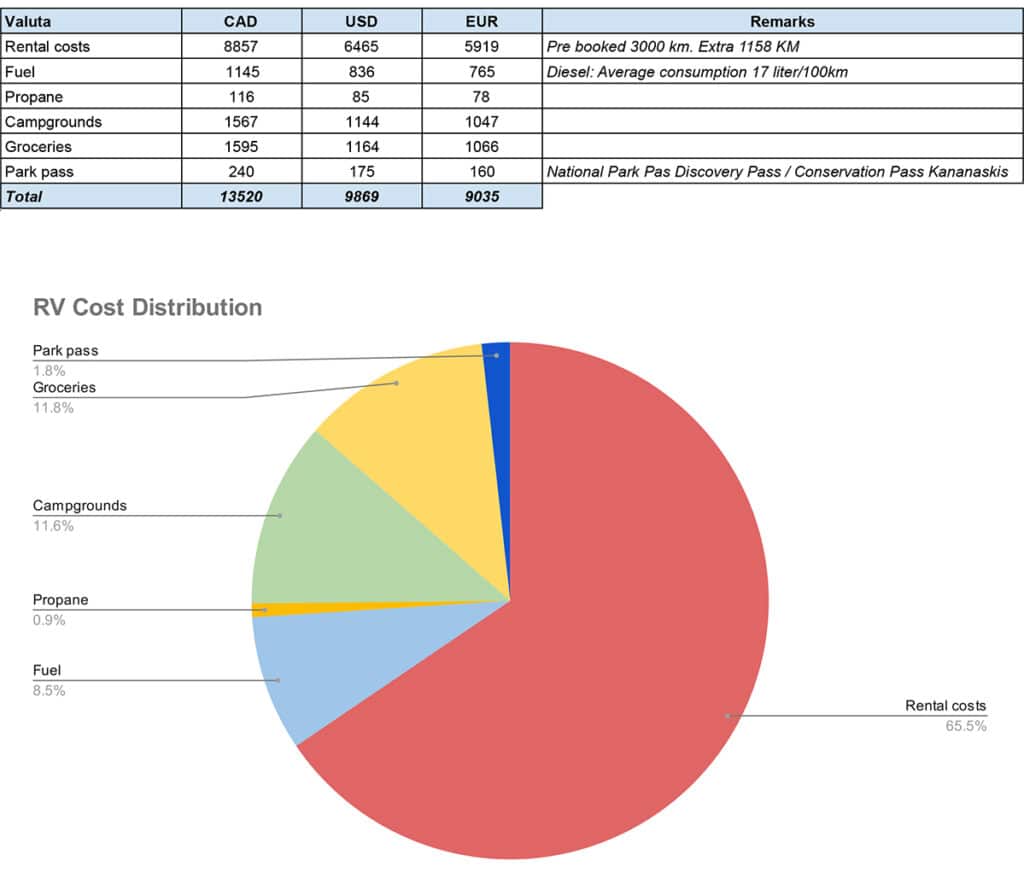
We were surprised by how long the two propane tanks lasted as these were used for the fridge, heater and stove. The total costs for propane are not too bad. But refuelling this big truck was sometimes painful. The fuel tank of our truck camper is very large and to fill up an empty tank we had to spend around CAD250. Luckily we could drive around 1000 km with a full tank.
For groceries, we tried to find a Walmart as they are reasonably priced. Unfortunately, you will only find Walmarts in the larger cities. In our experience, the grocery stores in popular places like Banff and Jasper are more expensive, so keep this in mind and stock up at Walmart whenever possible. Especially products that cannot spoil.
For example, we always stocked up a lot of spring water as the water from the RV fresh water tank is not advisable as drink water.
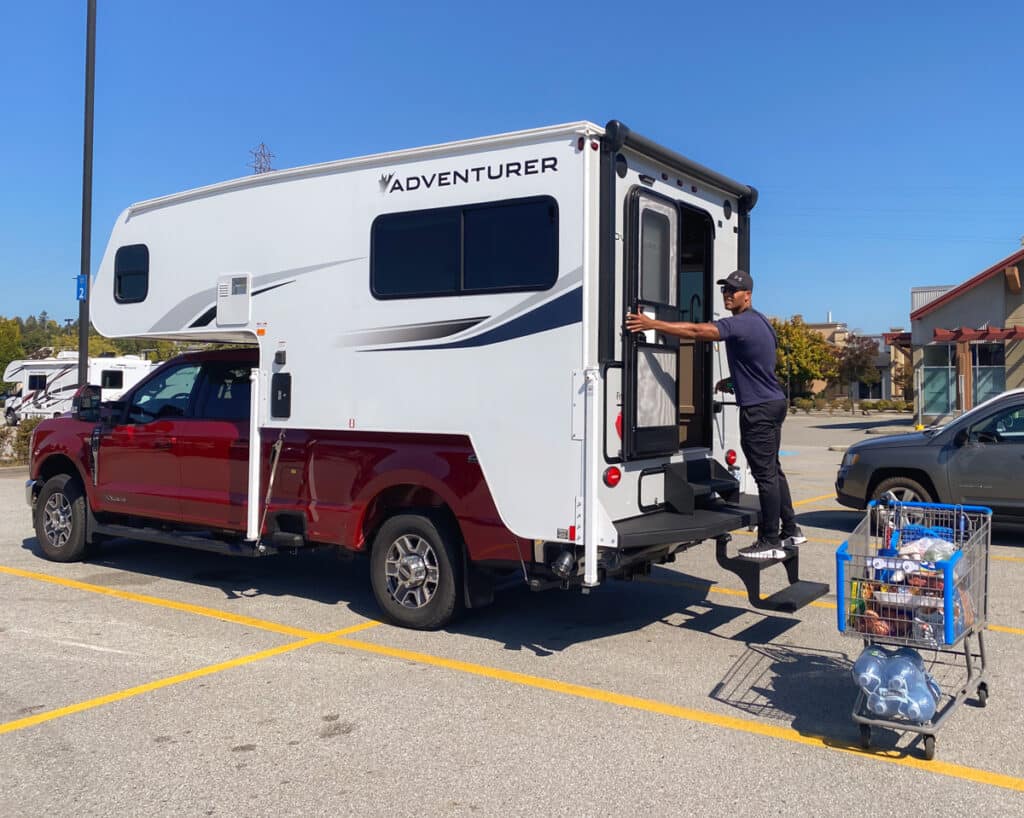
What are RV Parks in Canada like?
RV Parks in Canada are offered through the Canada National Park website or you can book at private campgrounds. As said before we had the best stays at private campgrounds. From our experience, the private campgrounds are mostly cleaner and offer more facilities. Some of the National Park campgrounds are a bit outdated, especially the showers and toilets at these locations are not always the best.
One thing that annoyed us the most from the National Park campgrounds around Banff is the fact that is was almost impossible to find a campground not close to the Canada Pacific Railway. When the train passes by, it uses an extremely loud train horn which you will feel throughout your whole body. And this not happens only during the day… So make sure to take some earplugs with you for a better sleep.
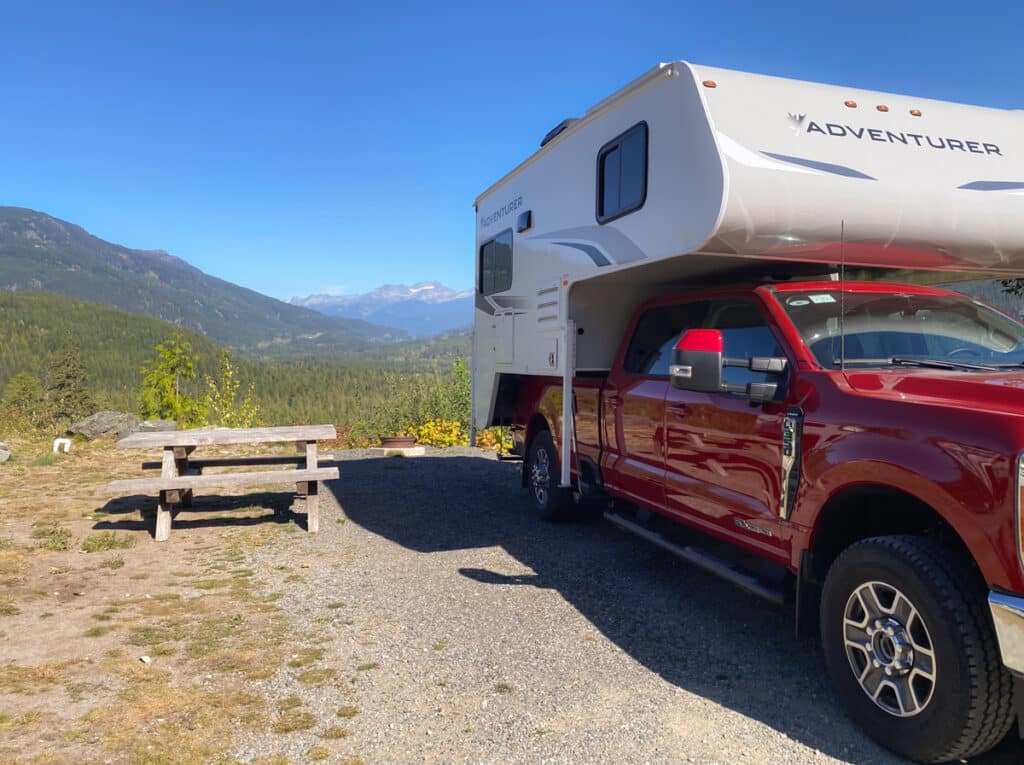
So if I have to mention something negative about this RV trip it’s about the Canada Pacific railway. When visiting Banff/Canmore, but also Chilliwack and Revelstoke there is a big chance this railway wakes you up at night. I understand it’s for safety to warn people crossing the tracks of the approaching train. But these days you should expect some innovation from Pacific Railway to prevent the often use of very loud train horns, especially in the middle of the night.
Take in mind it’s quite rare to find a campground with laundry facilities. Some offer laundromats but if not you need to find a public one.
What license do I need for RV Rental in Canada?
In Canada, the license requirements for RV rentals depends on the type and size of the RV you plan to rent. Most standard RVs, including Class B and C Motorhomes, can be driven with a regular driver’s license (Class G) in Canada. A G license allows the license holder to drive any car, van, small truck, or a combination of a vehicle plus a towed vehicle up to a weight of 11,000 kg (maximum weight of towed vehicle alone is 4,600 kg).
Visitors from outside Canada usually can drive with their valid driver’s license from their home country for a short duration. However, it’s essential to check specific provincial requirements and regulations. While not always mandatory, an International Driving Permit (IDP) may be recommended, especially if your driver’s license is not in English or French. The IDP serves as a translation of your license and can be helpful in case of language barriers.
The minimum age requirements for renting an RV vary by rental company and province. In most cases, renters must be at least 21 years old, and additional fees or restrictions may apply for drivers under 25. Always verify the specific requirements with the RV rental company you choose.
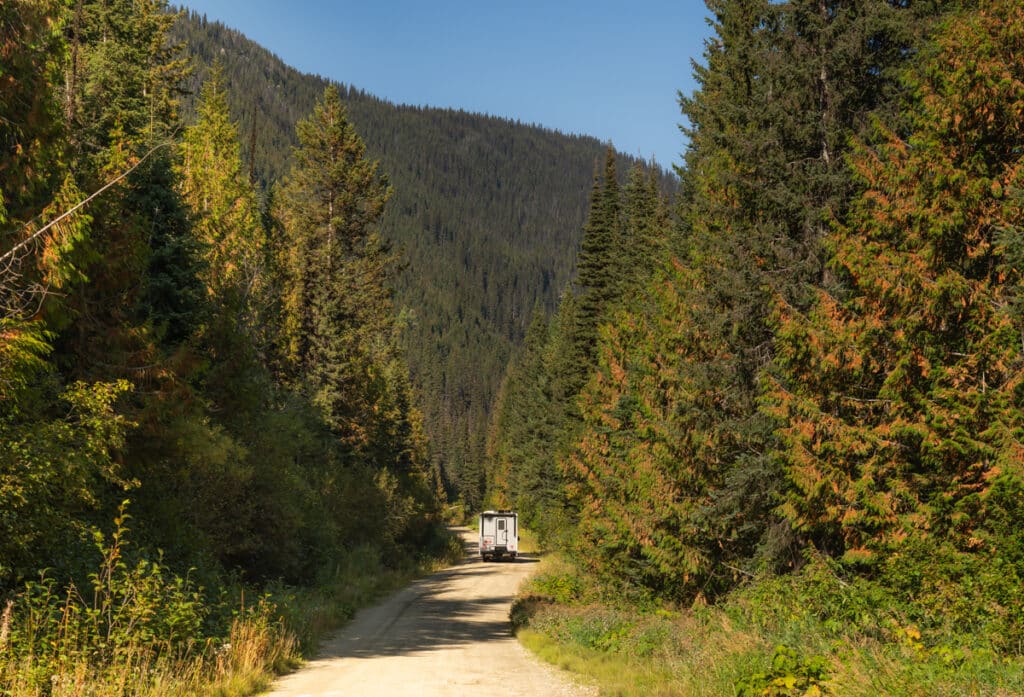
Isn’t RVing just for retirees?
Short answer, no it isn’t. Although RVing in Canada is very popular for retirees, you will see plenty of young people and families enjoying the RV life. What surprised us the most was how many people live full-time in an RV. Some campgrounds had a designated area for full-time RV-ers. It seems full-time RVing in Canada is popular for people who work remotely, fishermen (seasonally), or even people who suffered financially and had to sell their house. Most full-time RVers are very friendly and it’s interesting to see how they decorate their campspot with all kinds of pots, bbq, tents, and quads.
Where to rent your RV in Canada?
Selecting the right RV for your road trip in Canada can be a time consuming task. There are many RV rental companies and many campers for rent in Canada. Luckily you don’t have to search the entire internet for all rental companies by using Motorhome Republic. We’ve booked our Truck Camper through this website and it made the whole process super easy. They are one of the world’s largest online Motorhome and RV rental agency. A great thing about booking with Motorhome Republic is they are committed to offer the lowest rental rate you can find online.
Every price on their website is subject to their dynamic Low Price Program. With this they regularly price check against their competitors and actively manage and negotiate with suppliers on your behalf, to get you a great deal. They even offer you the possibility to send them an email in case you find a better quote on the same vehicle from another website.
Our best trip ever
Our RV trip through Canada was our best trip ever! The freedom we experienced combined with the otherworldly nature is the perfect combination for us. This was definitely not our last RV experience. It just started and we plan to enjoy many more RV trips in the future!

More Canada travel inspiration
I hope you enjoyed this complete guide about RVing in Canada. If you have any questions, feel free to reach out! For more travel inspiration about British Columbia and Alberta, head over to our other Canada travel guides.

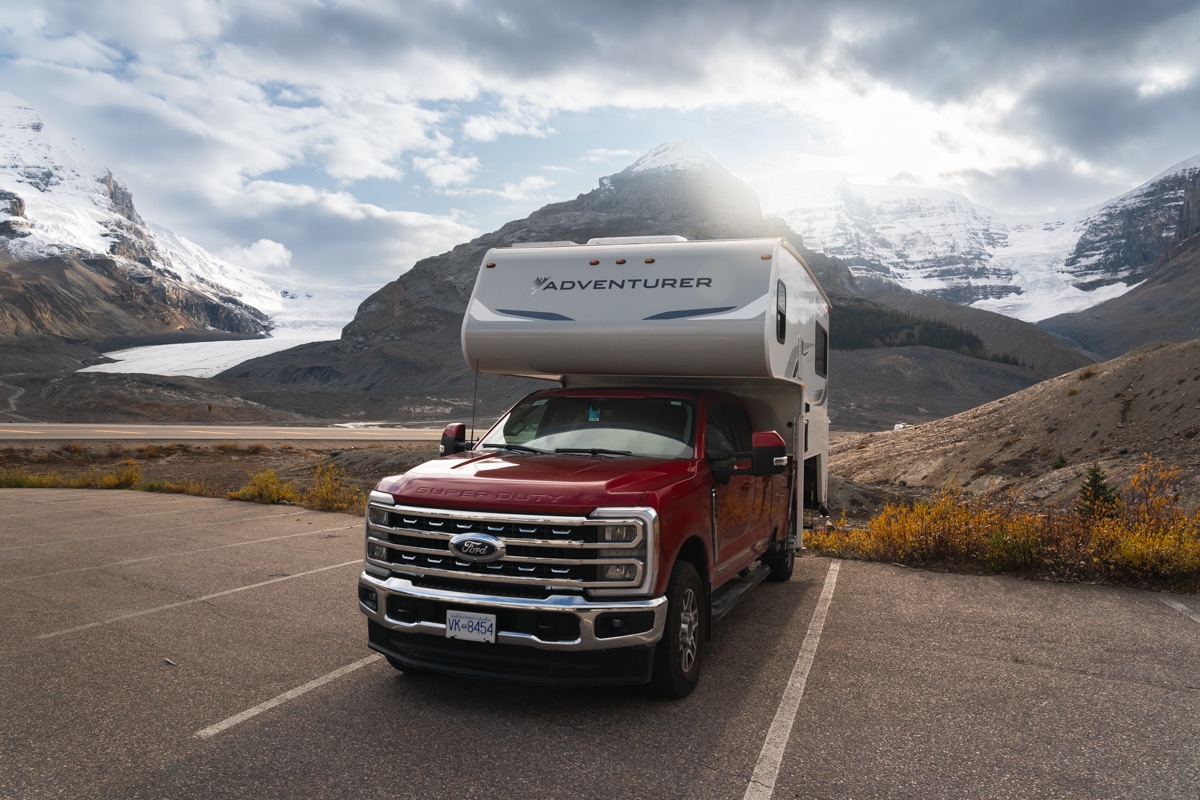
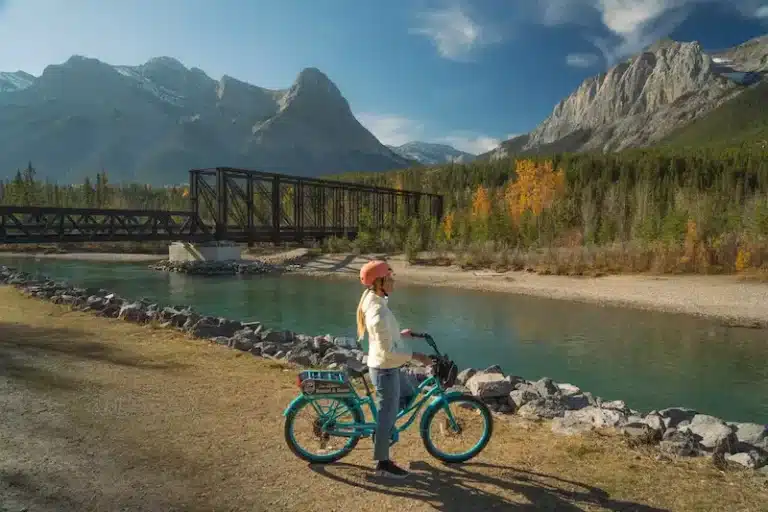
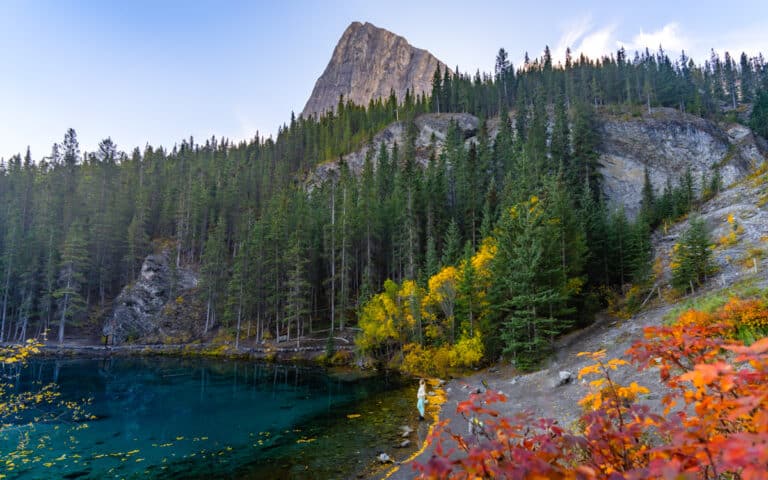
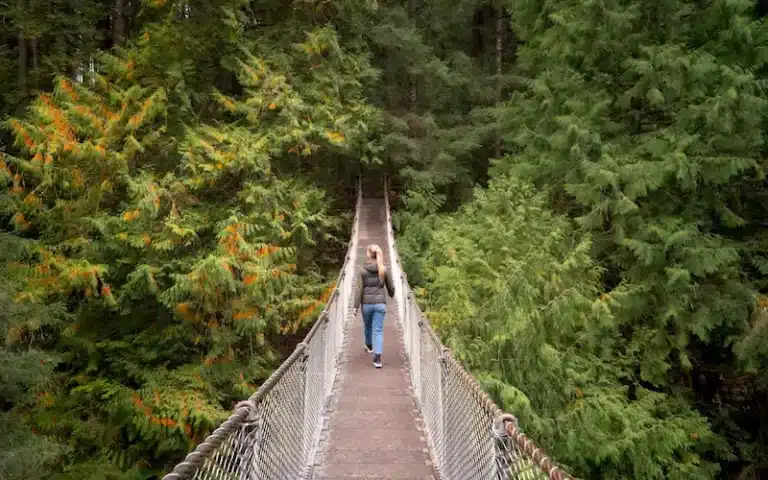
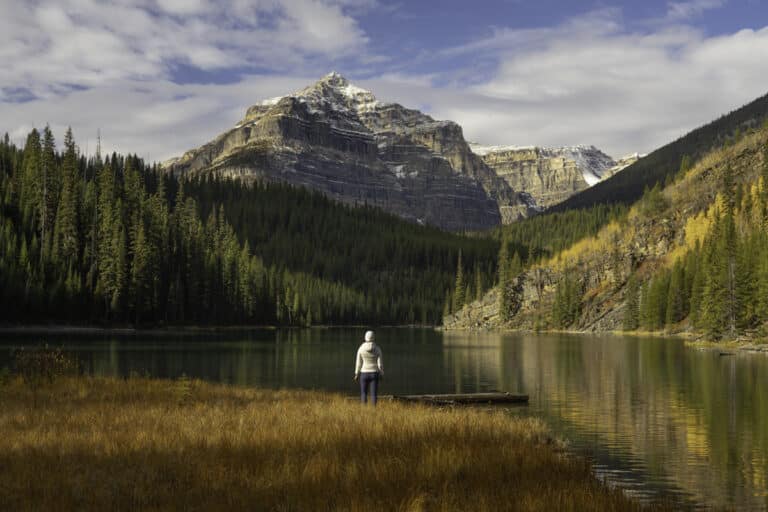
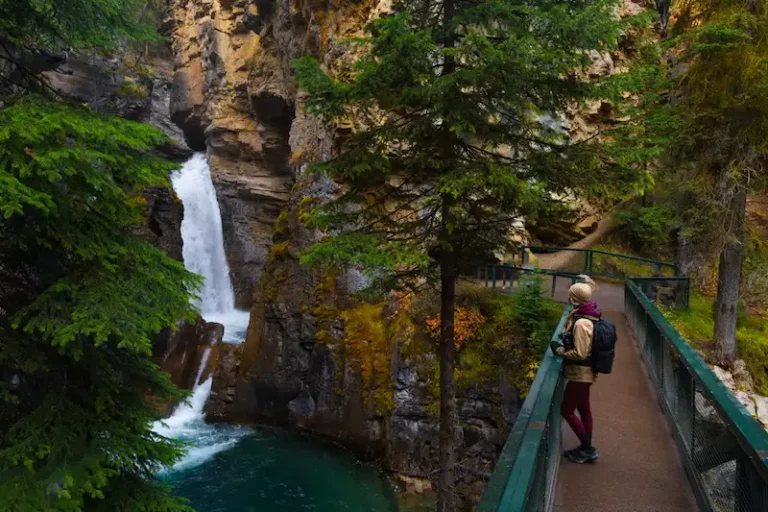

This post may contain affiliate links
We hope this guide will help you plan your travels! If you consider booking your accommodation, tours or rental car via our affiliate links, you support this blog because we earn a small commission at no additional cost to you!